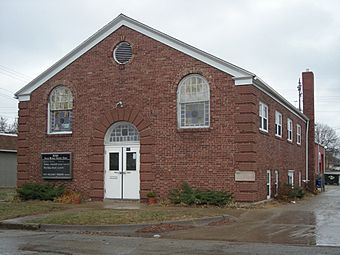Bethel African Methodist Episcopal Church (Cedar Rapids, Iowa) facts for kids
Quick facts for kids |
|
|
Bethel African Methodist Episcopal Church
|
|
 |
|
| Location | 512 6th Street, SE Cedar Rapids, Iowa |
|---|---|
| Area | less than one acre |
| Built | 1931 |
| Architectural style | Colonial Revival |
| NRHP reference No. | 13000927 |
| Added to NRHP | December 18, 2013 |
The Bethel African Methodist Episcopal Church is a very important building located in Cedar Rapids, Iowa, United States. It is special because its church community, also called a congregation, started in 1870 or 1871. This makes it the oldest church in Cedar Rapids that was founded by and for African American people. For many years, this church has been a central place for its community, helping with both religious needs and social gatherings.
A Long History
The Bethel African Methodist Episcopal Church began its journey a long time ago, either in 1870 or 1871. In its early years, up until 1928, the church had 23 different pastors. This was a common practice for the African Methodist Episcopal Church, where pastors would travel and serve different churches for a period of time.
Over these years, the church community grew steadily. Many African American families moved to Cedar Rapids, especially after the coal mining industry in Southern Iowa started to decline. This brought more people to the city and to the church.
Building a New Home
In 1928, a new pastor named Reverend Benjamin Horace Lucas joined the church. He helped the congregation grow even more. The church needed a bigger and stronger building. So, in 1931, a new church building was completed. This new building was made of brick and designed in the Colonial Revival style. It replaced an older wooden church that had been built in 1876.
Why This Church is Special
Since it was finished in 1931, the Bethel African Methodist Episcopal Church has been a vital part of the community. It has served the religious and social needs of its members.
This church building is also one of the few remaining connections to Cedar Rapids' early African American community. Much of the neighborhood around it has changed a lot due to the growth of Mercy Medical Center. Because of its important history and role, the church building was added to the National Register of Historic Places in 2013. This means it is recognized as a significant historical place in the United States.
See also
- African-Americans of Cedar Rapids, Iowa
References



